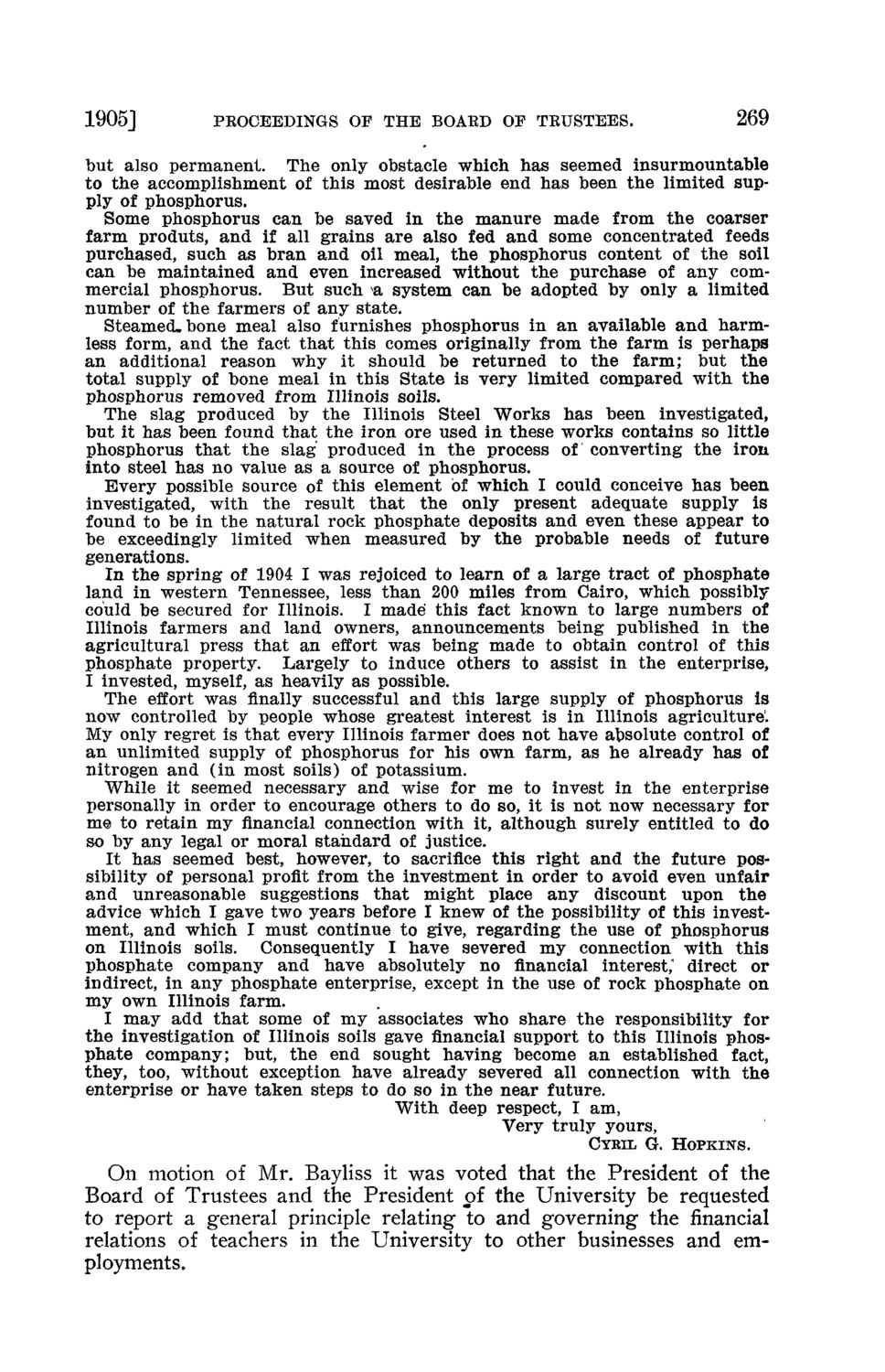| |
| |
Caption: Board of Trustees Minutes - 1906
This is a reduced-resolution page image for fast online browsing.

EXTRACTED TEXT FROM PAGE:
1905] PEOOEEDINGS OF THE BOAKD OF TEUSTEES. 269 hut also permanent. The only obstacle which has seemed insurmountable to the accomplishment of this most desirable end has been the limited supply of phosphorus. Some phosphorus can be saved in the manure made from the coarser farm produts, and if all grains are also fed and some concentrated feeds purchased, such as bran and oil meal, the phosphorus content of the soil can be maintained and even increased without the purchase of any commercial phosphorus. But such a system can be adopted by only a limited number of the farmers of any state. Steamed* bone meal also furnishes phosphorus in an available and harmless form, and the fact that this comes originally from the farm is perhaps an additional reason why it should be returned to the farm; but the total supply of bone meal in this State is very limited compared with the phosphorus removed from Illinois soils. The slag produced by the Illinois Steel Works has been investigated, but it has been found that the iron ore used in these works contains so little phosphorus that the slag produced in the process of converting the iron into steel has no value as a source of phosphorus. Every possible source of this element of which I could conceive has been investigated, with the result that the only present adequate supply is found to be in the natural rock phosphate deposits and even these appear to be exceedingly limited when measured by the probable needs of future generations. In the spring of 1904 I was rejoiced to learn of a large tract of phosphate land in western Tennessee, less than 200 miles from Cairo, which possibly could be secured for Illinois. I made* this fact known to large numbers of Illinois farmers and land owners, announcements being published in the agricultural press that an effort was being made to obtain control of this phosphate property. Largely to induce others to assist in the enterprise, I invested, myself, as heavily as possible. The effort was finally successful and this large supply of phosphorus is now controlled by people whose greatest interest is in Illinois agriculture'. My only regret is that every Illinois farmer does not have absolute control of an unlimited supply of phosphorus for his own farm, as he already has of nitrogen and (in most soils) of potassium. While it seemed necessary and wise for me to invest in the enterprise personally in order to encourage others to do so, it is not now necessary for me to retain my financial connection with it, although surely entitled to do so by any legal or moral standard of justice. It has seemed best, however, to sacrifice this right and the future possibility of personal profit from the investment in order to avoid even unfair and unreasonable suggestions that might place any discount upon the advice which I gave two years before I knew of the possibility of this investment, and which I must continue to give, regarding the use of phosphorus on Illinois soils. Consequently I have severed my connection with this phosphate company and have absolutely no financial interest,' direct or indirect, in any phosphate enterprise, except in the use of rock phosphate on my own Illinois farm. I may add that some of my associates who share the responsibility for the investigation of Illinois soils gave financial support to this Illinois phosphate company; but, the end sought having become an established fact, they, too, without exception have already severed all connection with the enterprise or have taken steps to do so in the near future. With deep respect, I am, Very truly yours, CYRIL G. HOPKINS. O n motion of M r . Bayliss it was voted that the President of the Board of Trustees and the President of the University be requested to report a general principle relating to and governing the financial relations of teachers in the University to other businesses and employments.
| |